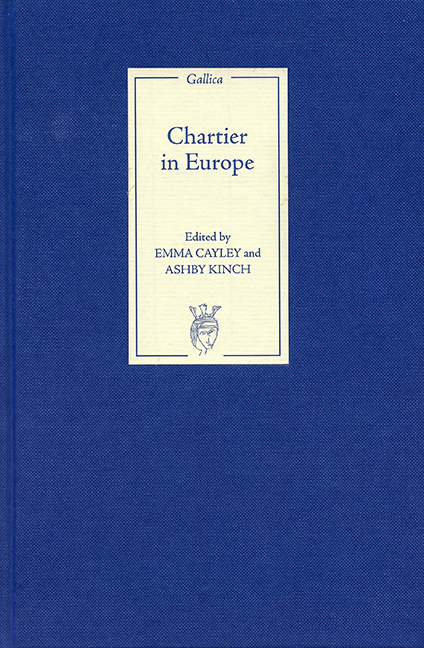Book contents
- Frontmatter
- Contents
- Foreword
- List of Contributors
- Acknowledgements
- List of Abbreviations
- Introduction
- Part I Authorising Chartier
- Part II Transmitting Chartier
- 5 ‘Ainchois maintien des dames la querelle’: Poetry, Politics and Mastery in the Manuscript Tradition of Alain Chartier
- 6 Cyclification and the Circulation of the Querelle de la Belle Dame sans mercy
- 7 The Early Reception of Chartier's Works in England and Scotland
- Part III Translating Chartier
- Bibliography
- Index
- Miscellaneous Endmatter
5 - ‘Ainchois maintien des dames la querelle’: Poetry, Politics and Mastery in the Manuscript Tradition of Alain Chartier
from Part II - Transmitting Chartier
Published online by Cambridge University Press: 24 October 2017
- Frontmatter
- Contents
- Foreword
- List of Contributors
- Acknowledgements
- List of Abbreviations
- Introduction
- Part I Authorising Chartier
- Part II Transmitting Chartier
- 5 ‘Ainchois maintien des dames la querelle’: Poetry, Politics and Mastery in the Manuscript Tradition of Alain Chartier
- 6 Cyclification and the Circulation of the Querelle de la Belle Dame sans mercy
- 7 The Early Reception of Chartier's Works in England and Scotland
- Part III Translating Chartier
- Bibliography
- Index
- Miscellaneous Endmatter
Summary
Ainchois maintien des dames la querelle,
Pour leur bonté qui croyt et renouvelle;
Et se je y fail de rien, je m'en rappelle
Et cry mercy et engaige l'amende.
This essay proposes a consideration of Alain Chartier's oeuvre in the material context of its fifteenth-century reception, through an exploration of the diverse manuscript tradition. The manuscript is conceptualised here as a space of play and Chartier posited as a site of authority and mastery, as well as key player within the codex. I offer a parallel study here of two manuscripts, typical of the two main branches of the transmission of Chartier's Latin and French works respectively: Tours, Bibliothèque municipale (BM), MS 978, and Paris, Bibliothèque nationale de France (BnF), fr. 1642. These two mss give us vital insights into the transmission patterns of Chartier's literary production; and into two ostensibly distinct domains of activity: political and diplomatic (the Latin and French prose works); poetic and playful (the French verse). The context of the Tours MS apparently directs us to the official, humanistic and Latinate world of the Paris chancery; while BnF, fr. 1642, appears to refer us to the non-official vernacular world of the ‘cour amoureuse’ and courtly debate poetry. There is, however, more overlap between the two domains of Chartier's production than one might expect, particularly in the subtle interweaving of political and poetic discourses, as I reveal through an examination of the pieces collected in both these manuscripts, in text and paratext.
The Tours MS collects Chartier's anti-curial Latin letter, the De vita curiali, with other Latin epistles circulated between humanist scholars of the Paris chancery in the early fifteenth century, and also with Books XIV and XV of Boccaccio's De genealogia deorum gentilium (1350–74) which present a defence of poetry. Collected within BnF, fr. 1642, alongside Chartier's French works, we find debate poems which problematise gender, deal with the rejection of corrupt courtly mores and discourse, and call for the renewal of poetic language. The anthologisation of these poems with Chartier's texts hints, amongst other things, at a possible ‘profeminine’ prise de position by Chartier in the Querelle des femmes, a recurrent motif in Chartier's oeuvre picked up by the liminal quotation here from his Complainte.
- Type
- Chapter
- Information
- Chartier in Europe , pp. 75 - 90Publisher: Boydell & BrewerPrint publication year: 2008



